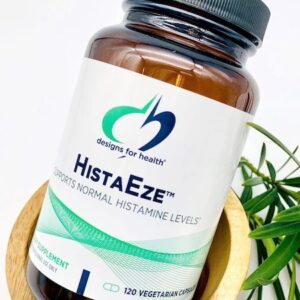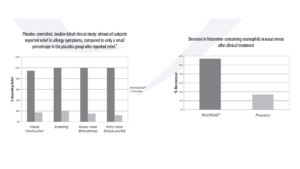It’s that time of year again, the days are getting longer and warmer and you are venturing outdoors with increased excitement. But if you’re an allergy sufferer, this time of year may make you cringe!
Will this year be as bad as the last? Will it be worse? Will it be obvious it’s “just allergies”? Do they think I have COVID?
The good news is that an integrative approach to seasonal environmental allergies can help you stave off or at the very least minimize your symptoms, as well as helping you to manage them should they arrive. An added bonus is that many of the lifestyle habits that mitigate allergies also contribute to your daily good health.
What are Seasonal or Environmental Allergies?
Allergies are your body’s natural response to a substance or substances deemed threatening to your immune system. It reacts, and attacks the invading substance in an effort to eliminate it. Upon repeated exposure, your body’s natural response may increase in severity, resulting in uncomfortable symptoms sometimes labeled as “allergic rhinitis”. Environmental allergies to irritants other than pollen, such as dust or pollution, can lead to similar symptoms.
Common Seasonal Allergy Symptoms
Year-Round or Seasonal
Environmental allergies generally occur during the spring and fall, but can trigger your immune system all year long. Tree, shrub and grass pollens and molds are the main seasonal culprits. If you suffer from indoor allergies like dust mites and dander as well, the mix of indoor and outdoor allergens can create the perfect environment for an aggravated immune system that reacts.
Different for Everyone
It’s important to note that everyone’s immune system is different and allergies can develop over time. If you haven’t experienced allergies in the past and are experiencing symptoms, or, if you have experienced them, but are perplexed at symptoms showing up at a time of year you didn’t expect, an appointment with your healthcare practitioner can help you pinpoint the cause.
Managing Allergy Symptoms Naturally
Antihistamines may be the medication your MD prescribes for severe symptoms, however there are many natural steps you can take to support your body, prevent and ease symptoms.
Nasal Irrigation
Allergens that are inhaled through your nose can stay there, and get inhaled deeper into your sinuses triggering your immune system. When you get a runny nose, that’s your body’s way of trying to eliminate the invading substances, but it doesn’t always work. You can assist it via nasal irrigation.
Nasal irrigation is the process of cleaning your sinuses by rinsing them with a saline solution. Saline water is poured into your sinuses from one nostril, and, via a head tilted sideways, the saline water comes out the other nostril, having traveled through, and effectively cleaning your sinuses. This process is repeated through the other nostril.
Neti pots have been traditionally used in Indian medicine for thousands of years to painlessly irrigate the nasal passageways, but there are also other options, including premade saline sprays that do the trick well.
Controlling Indoor Allergens
Minimizing indoor allergens can help reduce seasonal allergy symptoms. Aside from the regular offenders of dust mites and dander, outdoor allergens travel indoors through open windows. Keeping your windows closed during the spring and fall will help cut down on indoor irritants that pose a threat to your immune system.
That being said, outdoor allergens will still make their way into your home, via doors being open and individuals, including yourself, transporting them inside on your clothes, hair and shoes. If your allergies are severe, consider showering and changing your clothes once you’re home for the evening and launder your clothes and bedding regularly.
If that wasn’t enough, allergens can still move throughout your home aggravating your sinuses, so keeping your home especially clean during the spring and fall by vacuuming and dusting regularly can help. Investing in a HEPA filter air purifier is a fantastic way to keep your indoor air clean year round.
Acupuncture
Acupuncture works on the premise of supporting the body through balancing energy pathways and improving circulation. Originating in what is now China, acupuncture has been used to promote general good health for thousands of years. Studies have found that regular acupuncture sessions may help relieve runny nose, watering eyes, inflammation, scratchy throat, eczema and other symptoms associated with seasonal allergies.

Vitamin C
One of the most well-known and widely studied nutrients of our day, vitamin C (ascorbic acid) is a water-soluble vitamin with many functions in the body. Besides its antioxidant and immune-supportive roles, it is necessary for the body to make collagen in bones, cartilage, muscle, and blood vessels. It is a naturally occurring compound found in many plant foods, most notably citrus fruits, berries, pineapple, bell peppers, and broccoli.
Unlike chemical antihistamine medications, vitamin C reduces the amount of histamine you produce, rather than blocking histamine receptors. Take up to 2000mg per day during allergy/cold/flu season but no more than 600 mg at any given time point.
Long Term Strategies to Support Seasonal Allergy Symptoms
Support the Immune System
Reducing and managing stress, practicing good sleep hygiene, eating whole, nutrient dense foods and getting 30 minutes of regular, moderate physical activity daily all contribute to a healthy immune system (and a healthy brain btw).
 Nutritional supplements such as HistaEze™, which is one of my favorite allergy season supplements, is a synergistic blend of nutrients and botanical extracts designed to support a healthy immune response during times of seasonal upper respiratory challenges. It contains Tenofend, derived from the plant Tinospora Cardifolia (TC), quercetin, and nettles plant extracts that have been shown to support the immune system and the body’s natural inflammatory response upon exposure to environmental challenges as well as a hefty dose of vitamin C (500mg).
Nutritional supplements such as HistaEze™, which is one of my favorite allergy season supplements, is a synergistic blend of nutrients and botanical extracts designed to support a healthy immune response during times of seasonal upper respiratory challenges. It contains Tenofend, derived from the plant Tinospora Cardifolia (TC), quercetin, and nettles plant extracts that have been shown to support the immune system and the body’s natural inflammatory response upon exposure to environmental challenges as well as a hefty dose of vitamin C (500mg).
The plant Tinospora cordifolia has been used since the early 1900s in Ayurvedic medicine for its immunomodulating action. Tinofend has been clinically shown to regulate key immune mediators and stimulate the activity of macrophages (immune cells). Oxidative stress reduces the immune system’s ability to react to allergens. The polyphenols found in Tinofend® act as potent antioxidants, reducing oxidative stress, and thereby allowing the immune system to perform efficiently.
Most allergy treatments work by blocking histamine or leukotrienes, which are pro-inflammatory compounds responsible for allergic symptoms. This symptomatic approach, while initially helpful, does not fully address the underlying cause. Tinofend® addresses the cause of allergies by increasing the number of phagocytic white blood cells, including macrophages, which help consume and rid the body of allergens, and by reducing the number of eosinophils (cells that contain histamine).
The efficacy of TC extract in patients with allergic rhinitis was assessed in a randomized double-blind placebo controlled trial. Seventy-five patients were randomly given either TC or placebo for 8 weeks. With TC treatment 100% relief was reported from sneezing in 83% patients, in 69% from nasal discharge, in 61% from nasal obstruction and in 71% from nasal pruritus (itching). In the placebo group, there was no relief in 79% from sneezing, in 84.8% from nasal discharge, in 83% from nasal obstruction, and in 88% from nasal pruritus.

Quercetin is a flavonoid found in many foods, such as red onions, apples, cruciferous vegetables, and leafy greens that works to promote a healthy inflammatory response.*
Remember that saying “An apple a day keeps the doctor away.” Well there are many studies showing that this statment isn’t just a o’l wives-tale. There are actually many benefits to apples but since we are on the topic of allergies, studies have shown improved lung function and lower risk of certain respiratory diseases (i.e., asthma and bronchitis) in people with high apple (rich in quercetin) intake.
Nettles (a.k.a. “stinging nettle”) is a perennial flowering plant which has been employed throughout the ages and across the globe for a wide variety of purposes. Documentation points to its use in ancient Egypt, ancient Greece, and among native peoples in North America. Nettle has been consumed directly, or made into soup or tea. Its high content of vitamin C and iron underlies its immune-supporting effects. Nettle has traditionally been used for supporting respiratory and joint health. It is also a compound with natural abilities to help balance the body’s inflammatory response.
Vitamin D Synergy™ provides clinically useful doses of vitamin D3 and vitamin K (in the form of K1). Vitamins D and K are essential for optimal bone and arterial health and for maintaining the immune system in proper balance.* Optimal levels of vitamin D are between 50-80. Now this isn’t what your traditional doctor will tell you, they will let you go down towards 30 or even below before they will advise you to do something about it. So you find you are suffering from some chronic issues, raising your vitamin D levels by supplementation is a good first step toward a resolution.
Talk to your Functional Medicine/Integrative medicine practitioner to discuss a comprehensive look at what’s going on and supporting your immune system from the inside out.
Support Gut Health
The immune system and intestinal flora are intricately interconnected. A healthy intestinal system helps ward off allergens, while a poorly functioning intestinal system can lead to increased chances of experiencing allergy symptoms. Support your gut microbiome by reducing stress, removing irritating foods, addressing infections and parasites, decreasing sugar and caffeine and increasing foods that promote healthy gut microbiome such as sauerkraut, kimchi and other fermented foods. Digestive enzymes and probiotics offer additional support*.
Support A Healthy Inflammatory Response*
Stress, a sedentary lifestyle, and eating a diet rich in fatty, sugary and processed foods all contribute to creating inflammation in the body. Inflammation, when it becomes chronic, wreaks havoc on your your entire body and is the underlying cause for almost all disease. Support a healthy inflammatory response by managing stress, staying active and increasing your consumption of foods that may promote a healthy inflammatory response while adopting what is commonly referred to as an “anti-inflammatory diet”.
Foods that may promote a healthy inflammatory response include fruits, vegetables, cold water fish, and raw, unsalted nuts and seeds. Spices such as tumeric and ginger also help reduce inflammation so find ways to integrate them into your diet. Inflammatory foods to keep to a minimum include sugar, red meat, and anything processed.
If you’re struggling to get seasonal allergies under control, give me a call or work with a Functional Medicine provider who can help by looking deeper at your overall health to help you manage your allergies better and naturally. Together, we can create a customized plan to deeply support your body’s systems, and give you peace of mind as we move into allergy season and the rest of your life;-).
Be Well,
Dr. Kat
*This statement has not been evaluated by the FDA. This product is not intended to diagnose, treat, cure, or prevent any disease.
References
1. Carr AC, Maggini S. Vitamin C and Immune Function. Nutrients. 2017;9(11):1211. Published 2017 Nov 3. doi:10.3390/nu9111211
2. Feng S, Han M, Fan Y, et al. Acupuncture for the treatment of allergic rhinitis: a systematic review and meta-analysis. Am J Rhinol Allergy. 2015;29(1):57-62. doi:10.2500/ajra.2015.29.4116
3. Galli SJ, Tsai M, Piliponsky AM. The development of allergic inflammation. Nature. 2008;454(7203):445-454. doi:10.1038/nature07204
4. Hermelingmeier KE, Weber RK, Hellmich M, Heubach CP, Mösges R. Nasal irrigation as an adjunctive treatment in allergic rhinitis: a systematic review and meta-analysis. Am J Rhinol Allergy. 2012;26(5):e119-e125. doi:10.2500/ajra.2012.26.3787
5. Hua X, Goedert JJ, Pu A, Yu G, Shi J. Allergy associations with the adult fecal microbiota: Analysis of the American Gut Project. EBioMedicine. 2015;3:172-179. Published 2015 Nov 27. doi:10.1016/j.ebiom.2015.11.038
6. John Hopkins Medicine. Allergies and the Immune System https://www.hopkinsmedicine.org/health/conditions-and-diseases/allergies-and-the-immune-system
7. Khianey R, Oppenheimer J. Is nasal saline irrigation all it is cracked up to be?. Ann Allergy Asthma Immunol. 2012;109(1):20-28. doi:10.1016/j.anai.2012.04.019
8. Ohio State University College of Medicine Department of Internal Medicine, Division of Pulmonary, Allergy, Critical Care & Sleep Medicine: “HEPA Filters Help Some with Allergies.”
9. Taw MB, Reddy WD, Omole FS, Seidman MD. Acupuncture and allergic rhinitis. Curr Opin Otolaryngol Head Neck Surg. 2015;23(3):216-220. doi:10.1097/MOO.0000000000000161
10. Vollbracht C, Raithel M, Krick B, Kraft K, Hagel AF. Intravenous vitamin C in the treatment of allergies: an interim subgroup analysis of a long-term observational study. J Int Med Res. 2018;46(9):3640-3655. doi:10.1177/0300060518777044
11. Wu S, Xiao D. Effect of curcumin on nasal symptoms and airflow in patients with perennial allergic rhinitis. Ann Allergy Asthma Immunol. 2016;117(6):697-702.e1. doi:10.1016/j.anai.2016.09.427


